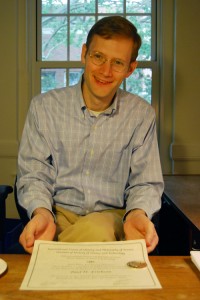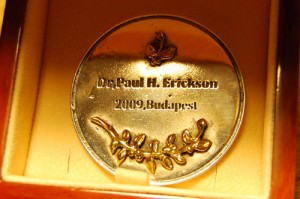Erickson Receives Young Scholars’ Prize in History of Science and Technology

Paul Erickson, assistant professor of history and assistant professor of Science in Society, has been awarded the 2009 Prize for Young Scholars from the International Union for the History and Philosophy of Science, Division of History of Science and Technology (DHST). He received the award at an August ceremony in Budapest, Hungary.
The award was bestowed in recognition for Erickson’s significant scholarly contribution to the History of Science in Western Civilization. The prize is awarded every four years at meetings of the Union Congress to recent PhDs in the history of science and technology for outstanding dissertation projects on topics in the western tradition. Erickson’s dissertation, “The Politics of Game Theory: Mathematics, Rationality, and Cold War Culture” impressed the award committee with its “innovative approach” and manner of making “mathematics and Cold War culture accessible for a critical discussion.”
In citing his dissertation, the prize committee stated “Erickson did a brilliant job in discussing a topic with a mathematical image in a real historical way.” The citation also heralded Erickson’s ability to explain the “incompatible applications of game theory in the military and evolutionary realm.” Notably, Erickson was selected for the Young Scholars award by unanimous vote of the prize committee.

Game theory, which models strategic interactions between rational individuals, was developed in the 1920s and `30s by the Hungarian-American mathematician John von Neumann and the Austrian economist Oskar Morgenstern. The theory’s original inspiration was parlor games like chess and poker, but in the wake of World War II, military-funded mathematicians found applications of the theory to problems of tactical decision-making and logistics. Subsequently, game theory has become a central modeling technique throughout the social and biological sciences, from economics and psychology to evolutionary biology, according to Erickson.
“Game theory is also a theory of how human beings should behave rationally, perhaps; how they do behave; how they might behave and so forth,” Erickson says.
”My work can be read on two levels. On one hand, it tells the history of game theory as a branch of mathematics. On the other, it presents a history of rationality in 20th century America by focusing on links between game theory and broader currents in American culture and politics,” he says.
Erickson explored the ways in which rationality became a seriously contested concept in the nation during the Cold War—especially from a political and cultural standpoint.
Erickson completed his PhD in the History of Science at the University of Wisconsin at Madison and has been at Wesleyan University since summer, 2008. He specializes in the science of the Atomic Age, the history of ecology, biology and technology, game theory’s wider applications in science and social science, the study of populations and science in public policy, among other research specialties and interests.
Photos from the Union Congress are available here.

